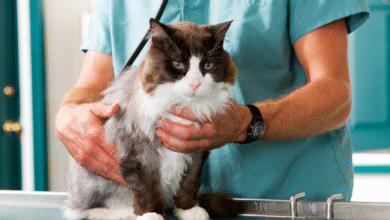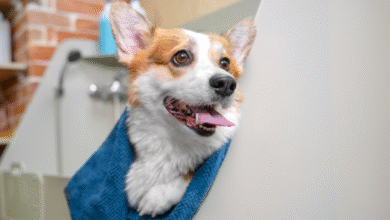Can Dogs Catch a Cold? A Full Guide to Cold Symptoms in Dogs at Home
Symptoms in Dogs at Home We’ve all experienced sick days ourselves—those times when we’re bundled up under blankets, sipping warm tea, and longing to feel better. But have you ever stopped to wonder if dogs experience something similar? Like humans, dogs can suffer from respiratory illnesses that cause symptoms resembling a cold. Understanding these symptoms is crucial for pet owners, so they can provide the best care and seek veterinary advice when necessary.
As a veterinarian, I often encounter dogs showing mild respiratory signs that might easily be mistaken for a simple cold. Recognizing the early signs and knowing when to intervene can make a big difference in your dog’s health and recovery. This guide will help you identify cold symptoms in dogs and offer practical advice on managing their illness safely at home.

Quick Takeaways
- Dogs can develop respiratory illnesses that closely resemble the common cold seen in humans.
- In most cases, these symptoms resolve naturally at home with some basic supportive care.
- If symptoms persist beyond a week or worsen, veterinary attention is necessary to rule out more serious conditions.
- Other diseases can mimic cold symptoms, so proper diagnosis is important.
Can Dogs Actually Catch a Cold?
The short answer is yes, dogs can get sick with symptoms similar to a cold. However, it’s important to understand that they do not catch colds from humans, as the viruses that cause human colds are species-specific and don’t transmit to dogs. Instead, what we call a “dog cold” usually refers to respiratory infections caused by canine-specific viruses and bacteria.
These infections can produce symptoms that look very much like a human cold—sneezing, coughing, runny nose—but they arise from different pathogens that specifically target dogs. Identifying cold symptoms in dogs early on helps pet owners differentiate between minor illnesses and potentially more serious diseases.
Common Cold Symptoms in Dogs
If your dog catches a cold, you may observe several signs that indicate they are not feeling well. These include frequent sneezing, coughing, a runny or stuffy nose, watery eyes, lethargy, mild fever, and sometimes a loss of appetite. Each of these symptoms can vary in intensity depending on the dog’s age, immune system strength, and the exact cause of the infection.
Typically, cold symptoms in dogs last around 5 to 10 days. During this time, gradual improvement should be expected with proper rest and care. However, if symptoms linger beyond this period or seem to worsen, it is advisable to consult your veterinarian. Monitoring your dog’s condition closely is key to ensuring a full recovery and preventing complications.
What Causes Dog Colds?
Several viruses and bacteria can cause respiratory infections in dogs, resulting in what we commonly refer to as dog colds. Among the most common are canine adenovirus and canine respiratory coronavirus—different from the coronavirus that affects humans. Exposure to infected dogs, especially in places like dog parks or shelters, is a frequent cause of transmission.
Environmental factors also play a role; cold and damp weather can weaken a dog’s immune defenses, making them more susceptible. Additionally, puppies, senior dogs, or dogs with weakened immune systems due to chronic illnesses are more vulnerable to catching these infections. Understanding these causes helps owners take preventive measures to protect their furry friends.
How to Treat Dog Colds at Home
Managing a dog’s cold at home is often straightforward and involves supportive care similar to how we treat human colds. Most dogs recover without the need for medication, provided they receive plenty of rest and attention. Below are several practical steps you can take to help your dog feel better during their illness:
1. Provide Rest
Rest is essential for your dog’s immune system to fight off the infection effectively. Create a quiet, comfortable space where your dog can relax without disturbance. Reducing activity levels helps conserve energy and supports faster recovery.
2. Keep Them Hydrated
Ill dogs often drink less water, increasing the risk of dehydration. Make sure fresh, clean water is always accessible. You can encourage drinking by adding ice cubes or offering wet food, which also helps keep them hydrated and nourished.
3. Warm the Environment
Cold weather can worsen respiratory discomfort in dogs. Keep your dog warm with blankets and avoid bathing them while they are sick, as this may further lower their body temperature and prolong symptoms.
4. Try Steam or Humidifiers
Dry air can irritate your dog’s respiratory tract and exacerbate symptoms. Using a humidifier or allowing your dog to spend time in a steamy bathroom can ease breathing by moistening nasal passages and reducing congestion.
5. Limit Contact with Other Dogs
During recovery, it is important to keep your dog away from other dogs to prevent spreading the infection. Avoid dog parks and social gatherings until your dog has fully recovered.

6. Offer Nutritious Food
Providing balanced, easy-to-digest meals helps maintain your dog’s strength and supports the immune response. Good nutrition is a vital part of recovery and can reduce the severity and duration of symptoms.
7. Avoid Irritants
Keep your dog away from cigarette smoke, strong perfumes, cleaning chemicals, and other irritants that could worsen respiratory symptoms or cause additional discomfort.
When to See a Vet
While many cases of dog colds resolve on their own, there are times when veterinary care is necessary. If your dog’s symptoms do not improve or if they worsen, it is important to seek professional advice. Watch for signs such as difficulty breathing, refusal to eat or drink, signs of pain, or severe lethargy, which warrant immediate veterinary attention.
How to Prevent Dog Colds
- Routine vet visits: Regular check-ups allow early detection of potential health issues.
- Vaccinations: Ensure your dog is vaccinated against common respiratory viruses and bacteria.
- Shelter: Provide protection from extreme weather conditions, especially cold and damp environments.
- Nutrition: Feed a balanced diet that supports immune health and overall well-being.
- Limit exposure: Avoid crowded dog parks during outbreaks of respiratory illnesses to minimize risk.
Pets Best Insurance Policy for Your Pets As a pet owner, you know how expensive vet care can be. Protecting your pets with the right pet insurance is a big help. With so many choices, finding the best policy can feel tough.
Cold or Something Else?
Sometimes, symptoms that look like a cold in dogs might actually be signs of other diseases. Conditions such as kennel cough, allergies, bacterial or parasitic infections like heartworms, or even fungal infections can mimic cold symptoms. Because of this, proper diagnosis by a vet is essential if symptoms persist or worsen.
Conclusion
Although dogs do not catch colds from humans, they can suffer from respiratory illnesses with similar symptoms. Fortunately, most cases of dog colds can be effectively managed at home with appropriate care. Always monitor your dog closely and seek veterinary advice if you notice any concerning signs. With the right approach, your dog can recover comfortably and quickly from these common respiratory illnesses.
FAQs
Can dogs catch colds from humans?
No, the viruses responsible for human colds are different and cannot infect dogs. Therefore, dogs cannot catch a cold directly from people.
Do dog colds go away on their own?
Yes, in most cases, dog colds resolve naturally within 5 to 10 days with basic care and rest. However, persistent symptoms require veterinary attention.
How does a cold dog sound?
Common sounds include sneezing, coughing, and occasional wheezing. If breathing becomes labored or abnormal, it is important to consult a veterinarian promptly.
How long do dog colds last?
Typically, dog colds last between 5 to 10 days. Symptoms should gradually improve during this time with proper home care.
Additional Notes
Dogs’ immune systems are quite resilient, but stress, poor nutrition, or concurrent illnesses can worsen their response to respiratory infections. Keeping your dog healthy year-round through proper care, vaccinations, and minimizing stressors is the best prevention against colds and other illnesses.
If you have any concerns about your dog’s health or need personalized advice, don’t hesitate to contact your veterinarian. Early intervention can prevent minor symptoms from becoming serious health issues.
Summary Table
| Topic | Details |
|---|---|
| Can Dogs Catch a Cold? | Yes, dogs can catch respiratory infections, but not the same viruses as humans. |
| Common Symptoms | Sneezing, coughing, runny nose, watery eyes, lethargy, mild fever, loss of appetite. |
| Causes | Canine adenovirus, respiratory coronavirus, exposure to infected dogs, cold weather, weakened immunity. |
| Home Treatment | Rest, hydration, warm environment, humidifiers, nutritious food, avoiding irritants, limiting contact. |
| When to See a Vet | If symptoms worsen or persist, difficulty breathing, refusal to eat or drink, signs of pain. |
| Prevention | Routine vet visits, vaccinations, shelter from extreme weather, good nutrition, limit exposure during outbreaks. |
| Other Conditions | Kennel cough, allergies, bacterial/parasitic/fungal infections can mimic cold symptoms. |




